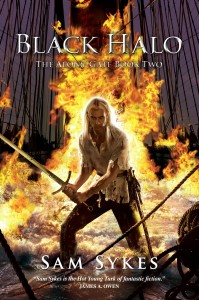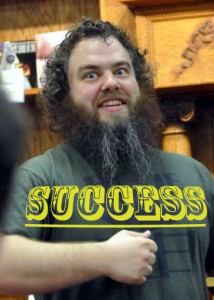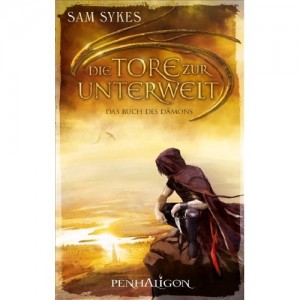HA! Look at that title! It’s funny because people are starving.
Some people fear turning into their parents. I sometimes fear that I’m turning into Joe Abercrombie (don’t bother, the paternity test proved negative) in that I’m committing the cardinal sin of not finding a lot to read in my own genre lately. Having eaten a lot of the big names and not really zazzed by anything else, I’ve turned to a genre that I’ve not really looked at for awhile: memoirs.
Specifically, memoirs regarding North Korea.
I found them purely out of chance, but the more I read, the more interested I became. People routinely complain that we’ve nothing more to explore, that the map is entirely filled out. The very fact that North Korea exists proves them wrong. A nation completely closed off from the rest of the world, North Korea is the last frontier of civilization: a world where we may never see and which exists in myth as much as it does in reality.
And the reason we don’t know about it is that it’s not quite as romantic as the great wilderness we typically imagine when we think of “frontier.” What with the starving people and backwards society and violent Stalinist police state and all.
Still, there is nothing more worth knowing than something someone doesn’t want you to know, so I read three books regarding the nation and was very impressed by them, though in varying orders.
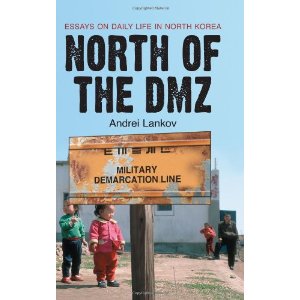 North of the DMZ: Essays on Daily Life in North Korea by Andrei Lankov
North of the DMZ: Essays on Daily Life in North Korea by Andrei Lankov
This was the last one I read, but the one I was least involved in. It’s not that it wasn’t informative. Lankov goes in-depth on exactly what he claims to: daily life in North Korea.
Everything about the book relates to the humdrum activities in North Korea: transportation, relationships, etiquette under the watchful eye of Kim Jong Il, life as people live it when they are starving and closed off from the rest of the world. There is pretty much everything here to describe exactly how North Korea’s citizenry works, how it plays (not much) and how it keeps itself running. Lankov is a citizen of the former Soviet Union and thus was given a unique insight into the nation’s workings, comparing them to other Stalinist regimes and predicting its downfall.
It’s outstandingly informative…about everything except the people. It wasn’t Lankov’s fault, of course, for having been read after the other two books in my kick, but I was sort of hoping for more of a personal edge instead of the glut of impersonal information about structure and society than I got. I got those, after all, in the other two books with the added bonus of people I could relate to and get involved in.
Beyond that, though, a common issue I found in books about the nation was that it has changed a lot (for the worse) in the last twenty years. So while Lankov was commenting on a quirky, oppressive society that he predicted would end soon, the reality of the situation is something far worse and more horrifying.
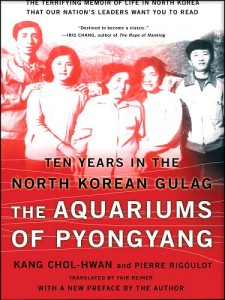 The Aquariums of Pyongyang by Kang Chol-Hwan and Pierre Rigoulot
The Aquariums of Pyongyang by Kang Chol-Hwan and Pierre Rigoulot
The Aquariums of Pyongyang is an amazingly heartbreaking and interesting story about the people of North Korea and how they were betrayed by their own government. Following the author’s life, from the moment his Korean-born Japanese-emigrated left-wing grandmother convinced the family to go to the North to the moment his family was found guilty of trumped-up anti-nationalist crimes to the moment he was imprisoned in a labor camp to the moment he was let out and escaped to the South, it’s basically a series of events illustrating the horrifying conditions in the nation’s network of “secret” labor camps.
And it is horrifying, friends. To his credit, the author is emotionally involved without being grotesque or his views being compromised. I was concerned, slightly, about the book’s academic integrity when I read the foreword that looked heavily into the author’s religious views, but he treats the subject with as much of an unbiased look as he can…you know, having been unfairly convicted and sentenced to subhuman and inhumane conditions.
It’s an incredible look into something a lot of us suspected the world left behind after WWII and the conditions and acts that go on will probably likely shock a lot of readers. As I said, though, it’s not at all gratuitous and the aim is not to disgust or offend but to inform. It’s definitely worth looking into if you’ve ever been at all curious as to what goes on behind the scenes.
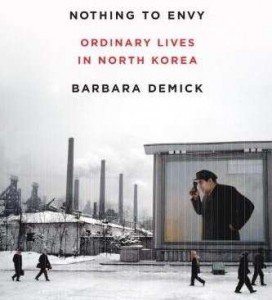 Nothing to Envy: Ordinary Lives in North Korea by Barbara Demick
Nothing to Envy: Ordinary Lives in North Korea by Barbara Demick
This was the first book I read in my kick and, as it turns out, the best. Demick, a journalist in South Korea, spent years collecting stories from six defectors from the regime to North Korea. Their walks of life couldn’t be any more different: a privileged man from a good family background destined to rise in the regime’s power, a doctor betrayed by her own nation, a mother who believed wholly and unabashedly in the regime’s righteousness and her daughter who couldn’t disagree more, a troublemaker and vagabond who grew up without father or future in the regime and a young girl from a disgraced family background destined for the worst the nation could have offered.
There’s an immense amount to praise in this book: the fact that it’s told from the stories and perspectives of these people who grew up within a regime lends it a startlingly emotional element while, at the same time, it refuses to pull any punches and coddle the reader. It follows the defectors from birth to present day, including the shockingly difficult transition into South Korean society that grips until the very end of the book and leaves you hoping that these people find their way. And beyond that, it goes into the stranger parts of the country: how a society claiming to espouse the Communist ideals of egalitarianism still very much supports and encourages the idea of familial background and status being integral to a person, the bizarre forms of dating and romance etiquette, the systems designed to encourage neighbor to despise neighbor and family to distrust family.
But what makes this book really the best out of the three is the fact that it’s so recent. Demick’s defectors were around from the time when the North enjoyed relative prosperity after being propped up by the USSR and China to the time when food was so scarce that people had to eat tree bark to survive. This gives a distinct arc to the book that lets us follow the decline of the nation and how it affects the defectors’ lives and each defectors’ pivotal moment when they realize there is a world beyond their own is incredibly moving.
I can’t recommend this book enough, whether you’re at all interested in the subject or not. If you are, it’s informative, detailed and authentically insightful. If you’re not, it’s an incredible story about people living in lies and discovering an entirely different world. I don’t mean that in a romantic comedy way, either, where some privileged white chick discovers Italian food or some stupid shit. This book will freak you the fuck out.
